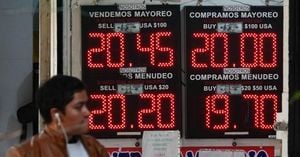Libya is grappling with alarming price increases for staple food items as the country’s economy continues to face turmoil. Items such as flour, sugar, milk, and cooking oil have seen prices soar, leaving many families struggling to afford basic necessities.
The increase in food prices, described as devastating by many citizens, has been attributed to the devaluation of the Libyan dinar, which has significantly impacted purchasing power. Ali Abdallah, a local store owner, stressed the severity of the situation, saying, "The increase in food prices is devastating for families already struggling to make ends meet," as reported by Al Jazeera.
Recent data shows price hikes of up to 200% for some basic food items. For example, flour, which previously cost around 1.50 dinars per kilogram, has now climbed to over 4 dinars. Sugar and cooking oil have also followed suit, aggravting the challenges faced by households.
Leila Mohammed, a consumer rights advocate, pointed out the broader consequences of these increases, stating, "We are facing food insecurity, and the government needs to take action quickly to stabilize prices," as reported by BBC. Her statement underlines the urgent need for government intervention to protect Libyan families from hunger and discontent.
Analysts cite the dinar's devaluation as the primary culprit behind these soaring costs. Reportedly, the dinar has lost over 80% of its value against the dollar over the past two years, making imports considerably more expensive. Omar Saleh, an economist, explained the economic dynamics affecting food prices, declaring, "The dinar's devaluation has made it difficult for businesses to import food products, leading to shortages and inflation," as discussed on Reuters.
With each passing day, the situation worsens as local supermarkets struggle to maintain stock. Many consumers are left at the mercy of rising prices, leading to significant changes in shopping habits. Families are forced to make difficult choices, whether to buy less nutritious options or reduce the quantity of food they purchase.
The economic crisis, exacerbated by political instability and civil conflict, has left Libya's citizens vulnerable. Many working-class families, once able to afford basic provisions, now find themselves making drastic compromises. This has stoked public frustration and raised alarms among activists who worry about the social and political repercussions of increasing food insecurity.
People across Libya are also engaging in intense discussions about the impacts of these price increases through social media platforms. This outcry has put considerable pressure on the government to address the economic crisis effectively. Still, many feel their voices are falling on deaf ears.
Local advocacy groups have begun to mobilize, calling for demonstrations aimed at demanding greater accountability from the leadership. They argue for the right to food as one of the fundamental human rights. Activists are urging the government to prioritize food security and transparent communication with the public about the pressing issues the nation faces.
While families navigate these financial pressures, grocery stores like Abdallah's are also feeling the strain. Business has dropped as consumers cut back on spending. Many shop owners have been forced to raise their prices as suppliers reflect increased costs due to the dinar's plunge.
Despite these challenges, some shop owners express hopefulness, attributing these surges to external market factors rather than internal mismanagement. They call for government initiatives to stabilize the economy, including subsidies for basic goods which could alleviate some of the burdens placed on consumers.
At this pivotal moment, Libyans are left to ponder not just the immediate impacts of rising food prices, but the future of their nation. With every price hike, the community grows increasingly aware of the government’s potential failure to respond adequately. Their patience wanes, mirrored by the expiration of their savings and the overhauling of their lifestyle choices.
The echoes of these devaluations and surging prices signal more than just economic distress; they are markers of the societal fabric fraying under pressure. How Libya’s leaders will respond remains uncertain. Attempting to understand the nuances of this economic dip, citizens await constructive measures to ease their burdens.
Life for many continues under shadowy uncertainty, as the struggle for basic needs looms larger than ever.



